Hanqi Li
PaperGuide: Making Small Language-Model Paper-Reading Agents More Efficient
Jan 19, 2026Abstract:The accelerating growth of the scientific literature makes it increasingly difficult for researchers to track new advances through manual reading alone. Recent progress in large language models (LLMs) has therefore spurred interest in autonomous agents that can read scientific papers and extract task-relevant information. However, most existing approaches rely either on heavily engineered prompting or on a conventional SFT-RL training pipeline, both of which often lead to excessive and low-yield exploration. Drawing inspiration from cognitive science, we propose PaperCompass, a framework that mitigates these issues by separating high-level planning from fine-grained execution. PaperCompass first drafts an explicit plan that outlines the intended sequence of actions, and then performs detailed reasoning to instantiate each step by selecting the parameters for the corresponding function calls. To train such behavior, we introduce Draft-and-Follow Policy Optimization (DFPO), a tailored RL method that jointly optimizes both the draft plan and the final solution. DFPO can be viewed as a lightweight form of hierarchical reinforcement learning, aimed at narrowing the `knowing-doing' gap in LLMs. We provide a theoretical analysis that establishes DFPO's favorable optimization properties, supporting a stable and reliable training process. Experiments on paper-based question answering (Paper-QA) benchmarks show that PaperCompass improves efficiency over strong baselines without sacrificing performance, achieving results comparable to much larger models.
Reasoning-Driven Retrosynthesis Prediction with Large Language Models via Reinforcement Learning
Jul 23, 2025Abstract:Retrosynthesis planning, essential in organic synthesis and drug discovery, has greatly benefited from recent AI-driven advancements. Nevertheless, existing methods frequently face limitations in both applicability and explainability. Traditional graph-based and sequence-to-sequence models often lack generalized chemical knowledge, leading to predictions that are neither consistently accurate nor easily explainable. To address these challenges, we introduce RetroDFM-R, a reasoning-based large language model (LLM) designed specifically for chemical retrosynthesis. Leveraging large-scale reinforcement learning guided by chemically verifiable rewards, RetroDFM-R significantly enhances prediction accuracy and explainability. Comprehensive evaluations demonstrate that RetroDFM-R significantly outperforms state-of-the-art methods, achieving a top-1 accuracy of 65.0% on the USPTO-50K benchmark. Double-blind human assessments further validate the chemical plausibility and practical utility of RetroDFM-R's predictions. RetroDFM-R also accurately predicts multistep retrosynthetic routes reported in the literature for both real-world drug molecules and perovskite materials. Crucially, the model's explicit reasoning process provides human-interpretable insights, thereby enhancing trust and practical value in real-world retrosynthesis applications.
NeuSym-RAG: Hybrid Neural Symbolic Retrieval with Multiview Structuring for PDF Question Answering
May 26, 2025Abstract:The increasing number of academic papers poses significant challenges for researchers to efficiently acquire key details. While retrieval augmented generation (RAG) shows great promise in large language model (LLM) based automated question answering, previous works often isolate neural and symbolic retrieval despite their complementary strengths. Moreover, conventional single-view chunking neglects the rich structure and layout of PDFs, e.g., sections and tables. In this work, we propose NeuSym-RAG, a hybrid neural symbolic retrieval framework which combines both paradigms in an interactive process. By leveraging multi-view chunking and schema-based parsing, NeuSym-RAG organizes semi-structured PDF content into both the relational database and vectorstore, enabling LLM agents to iteratively gather context until sufficient to generate answers. Experiments on three full PDF-based QA datasets, including a self-annotated one AIRQA-REAL, show that NeuSym-RAG stably defeats both the vector-based RAG and various structured baselines, highlighting its capacity to unify both retrieval schemes and utilize multiple views. Code and data are publicly available at https://github.com/X-LANCE/NeuSym-RAG.
"From Unseen Needs to Classroom Solutions": Exploring AI Literacy Challenges & Opportunities with Project-based Learning Toolkit in K-12 Education
Dec 23, 2024Abstract:As artificial intelligence (AI) becomes increasingly central to various fields, there is a growing need to equip K-12 students with AI literacy skills that extend beyond computer science. This paper explores the integration of a Project-Based Learning (PBL) AI toolkit into diverse subject areas, aimed at helping educators teach AI concepts more effectively. Through interviews and co-design sessions with K-12 teachers, we examined current AI literacy levels and how teachers adapt AI tools like the AI Art Lab, AI Music Studio, and AI Chatbot into their course designs. While teachers appreciated the potential of AI tools to foster creativity and critical thinking, they also expressed concerns about the accuracy, trustworthiness, and ethical implications of AI-generated content. Our findings reveal the challenges teachers face, including limited resources, varying student and instructor skill levels, and the need for scalable, adaptable AI tools. This research contributes insights that can inform the development of AI curricula tailored to diverse educational contexts.
Compressing KV Cache for Long-Context LLM Inference with Inter-Layer Attention Similarity
Dec 03, 2024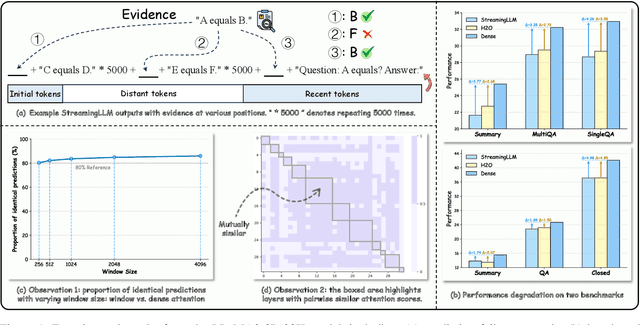



Abstract:The increasing context window size in Large Language Models (LLMs), such as the GPT and LLaMA series, has improved their ability to tackle complex, long-text tasks, but at the cost of inference efficiency, particularly regarding memory and computational complexity. Existing methods, including selective token retention and window-based attention, improve efficiency but risk discarding important tokens needed for future text generation. In this paper, we propose an approach that enhances LLM efficiency without token loss by reducing the memory and computational load of less important tokens, rather than discarding them.We address two challenges: 1) investigating the distribution of important tokens in the context, discovering recent tokens are more important than distant tokens in context, and 2) optimizing resources for distant tokens by sharing attention scores across layers. The experiments show that our method saves $35\%$ KV cache without compromising the performance.
Evolving Subnetwork Training for Large Language Models
Jun 11, 2024



Abstract:Large language models have ushered in a new era of artificial intelligence research. However, their substantial training costs hinder further development and widespread adoption. In this paper, inspired by the redundancy in the parameters of large language models, we propose a novel training paradigm: Evolving Subnetwork Training (EST). EST samples subnetworks from the layers of the large language model and from commonly used modules within each layer, Multi-Head Attention (MHA) and Multi-Layer Perceptron (MLP). By gradually increasing the size of the subnetworks during the training process, EST can save the cost of training. We apply EST to train GPT2 model and TinyLlama model, resulting in 26.7\% FLOPs saving for GPT2 and 25.0\% for TinyLlama without an increase in loss on the pre-training dataset. Moreover, EST leads to performance improvements in downstream tasks, indicating that it benefits generalization. Additionally, we provide intuitive theoretical studies based on training dynamics and Dropout theory to ensure the feasibility of EST. Our code is available at https://github.com/OpenDFM/EST.
Sparsity-Accelerated Training for Large Language Models
Jun 03, 2024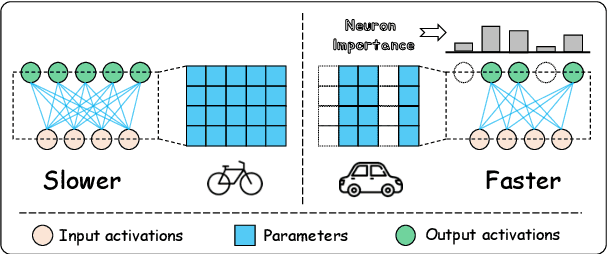
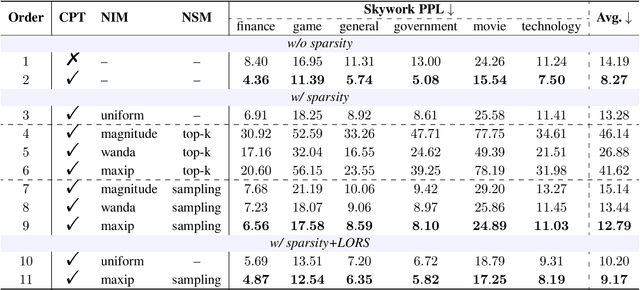
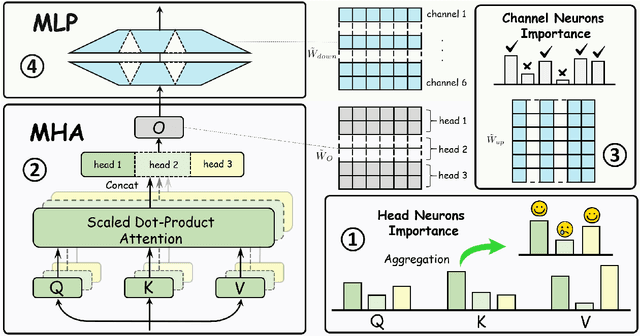

Abstract:Large language models (LLMs) have demonstrated proficiency across various natural language processing (NLP) tasks but often require additional training, such as continual pre-training and supervised fine-tuning. However, the costs associated with this, primarily due to their large parameter count, remain high. This paper proposes leveraging \emph{sparsity} in pre-trained LLMs to expedite this training process. By observing sparsity in activated neurons during forward iterations, we identify the potential for computational speed-ups by excluding inactive neurons. We address associated challenges by extending existing neuron importance evaluation metrics and introducing a ladder omission rate scheduler. Our experiments on Llama-2 demonstrate that Sparsity-Accelerated Training (SAT) achieves comparable or superior performance to standard training while significantly accelerating the process. Specifically, SAT achieves a $45\%$ throughput improvement in continual pre-training and saves $38\%$ training time in supervised fine-tuning in practice. It offers a simple, hardware-agnostic, and easily deployable framework for additional LLM training. Our code is available at https://github.com/OpenDFM/SAT.
Deep Lifelong Cross-modal Hashing
Apr 26, 2023



Abstract:Hashing methods have made significant progress in cross-modal retrieval tasks with fast query speed and low storage cost. Among them, deep learning-based hashing achieves better performance on large-scale data due to its excellent extraction and representation ability for nonlinear heterogeneous features. However, there are still two main challenges in catastrophic forgetting when data with new categories arrive continuously, and time-consuming for non-continuous hashing retrieval to retrain for updating. To this end, we, in this paper, propose a novel deep lifelong cross-modal hashing to achieve lifelong hashing retrieval instead of re-training hash function repeatedly when new data arrive. Specifically, we design lifelong learning strategy to update hash functions by directly training the incremental data instead of retraining new hash functions using all the accumulated data, which significantly reduce training time. Then, we propose lifelong hashing loss to enable original hash codes participate in lifelong learning but remain invariant, and further preserve the similarity and dis-similarity among original and incremental hash codes to maintain performance. Additionally, considering distribution heterogeneity when new data arriving continuously, we introduce multi-label semantic similarity to supervise hash learning, and it has been proven that the similarity improves performance with detailed analysis. Experimental results on benchmark datasets show that the proposed methods achieves comparative performance comparing with recent state-of-the-art cross-modal hashing methods, and it yields substantial average increments over 20\% in retrieval accuracy and almost reduces over 80\% training time when new data arrives continuously.
Decoupled Dialogue Modeling and Semantic Parsing for Multi-Turn Text-to-SQL
Jun 09, 2021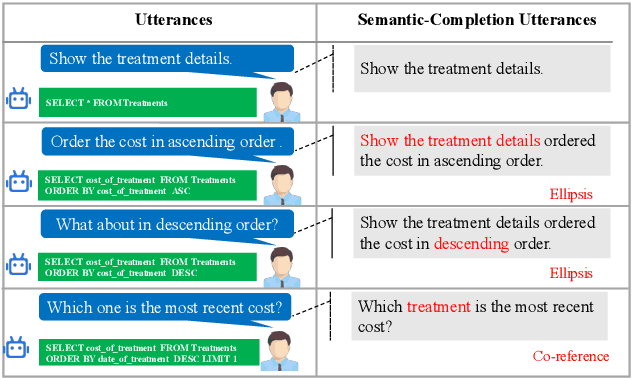

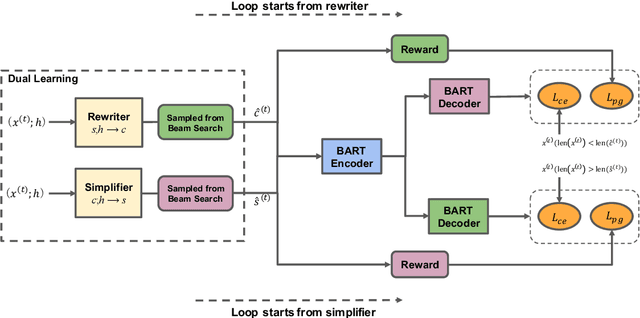

Abstract:Recently, Text-to-SQL for multi-turn dialogue has attracted great interest. Here, the user input of the current turn is parsed into the corresponding SQL query of the appropriate database, given all previous dialogue history. Current approaches mostly employ end-to-end models and consequently face two challenges. First, dialogue history modeling and Text-to-SQL parsing are implicitly combined, hence it is hard to carry out interpretable analysis and obtain targeted improvement. Second, SQL annotation of multi-turn dialogue is very expensive, leading to training data sparsity. In this paper, we propose a novel decoupled multi-turn Text-to-SQL framework, where an utterance rewrite model first explicitly solves completion of dialogue context, and then a single-turn Text-to-SQL parser follows. A dual learning approach is also proposed for the utterance rewrite model to address the data sparsity problem. Compared with end-to-end approaches, the proposed decoupled method can achieve excellent performance without any annotated in-domain data. With just a few annotated rewrite cases, the decoupled method outperforms the released state-of-the-art end-to-end models on both SParC and CoSQL datasets.
 Add to Chrome
Add to Chrome Add to Firefox
Add to Firefox Add to Edge
Add to Edge